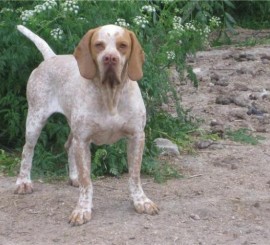The Pachon Navarro is a Spanish pointing breed, and is believed to be one of the oldest pointers of the Iberian peninsula. It’s possible this breed has been around since the Middle Ages! Since then, they are reported to have been shown in early Spanish dog shows – recorded to have participated in the 1890’s. They have been recognized by the Real Sociedad Canina (Spain’s major kennel club) since the inception of the club itself, although by the 1970’s were assumed to be extinct due to lack of numbers. An effort to revive the breed was quickly launched and the breed was barely brought back from the verge of extinction by using the few remaining dogs that could be found. Because they are still very rare, the FCI still does not recognize the breed and they are unknown outside of Spain.
The most unique physical feature of the Pachon is it’s double nose. The split that goes down the middle of every dog’s nose is heavily pronounced in this breed, giving it the appearance of having two separate noses! This is, of course, not actually the case although it does look very unusual and initially startling. While not every Pachon has this feature, it is certainly allowed in the standard and seen regularly. Other characteristics include a medium size with a robust and sturdy build, hanging ears that are flat and wide and a square muzzle. The coat is smooth yet thick, and a variety of colors can be seen. The thick tail is traditionally docked to about two-thirds of it’s original length.
The Navarro is a friendly and loyal beast although takes his hunting job very seriously. This is a dog that needs to have a job to do and will not be content as “just a pet”. This is not to say that he cannot fulfill the function of being a companion, however he must be given work to do – ideally hunting. As the breed would perform their original function in a pack setting, they do best when living with another canine buddy or two, especially if it’s another hunting breed! For obvious reasons, they don’t do as well with pet birds or pocket pets unless the smaller pets are kept safely and securely away.
The Pachon Navarro is intelligent and obedient when his owner takes the time to train him. Like many gun dogs, he needs to be kept on a leash when outside the property unless/until he has been trained. His high prey drive makes it likely for him to run after prey if he sees or smells a loose animal or bird. Not surprisingly, he takes naturally to any sort of gun dog work, and will instinctively retrieve. With obedience, he tends to learn fast although may benefit from extra lessons of attention training in the beginning. Stay consistent in your training and you’ll likely find him an eager and talented student!
The Pachon gets along well with kids, playing gently with them. He particularly enjoys doing so in a home with a large yard if at all possible! No apartments, please. This social pointer thrives on human companionship and should never be relegated to living outside or in a kennel. He will get upset if he is kept away from his humans for too long, meaning he also doesn’t do well in households in which his owner works all day. If put in that situation, he can become destructive and a problem chewer.
The Navarro will bark to alert the household of incoming guests at the door although is otherwise quiet. This is assuming that his needs are met, of course, including him receiving adequate exercise every day. A fairly active hunting dog, he requires daily walks and regular playtime – ideally with his owner. This loyal dog bonds very closely and, while friendly with other people, wants to spend his time with his immediate family most of all. Overall this is a steady-tempered, trustworthy breed without aggression (providing he was raised correctly). He is not known as a guard dog however if he is threatened will rise to the occasion. This would have to take a serious threat in order to elicit such a reaction.
Unfortunately, because modern Pachon Navarros are descended from a small group of dogs, the gene pool is relatively small. As such, they tend to have more health problems than other breeds. Cleft palate can occasionally be seen (as the condition is closely related to double nose feature in the breed), as well as hypothyroidism and epilepsy. It’s important to talk to the breeder in order to determine how risky a certain litter may be in terms of health. Aside from these health concerns, the Pachon is relatively easy to care for in terms of grooming. A weekly brushing is all that the coat needs to stay shiny and glowing, with only the very occasional bath.

Photo By 99bea
